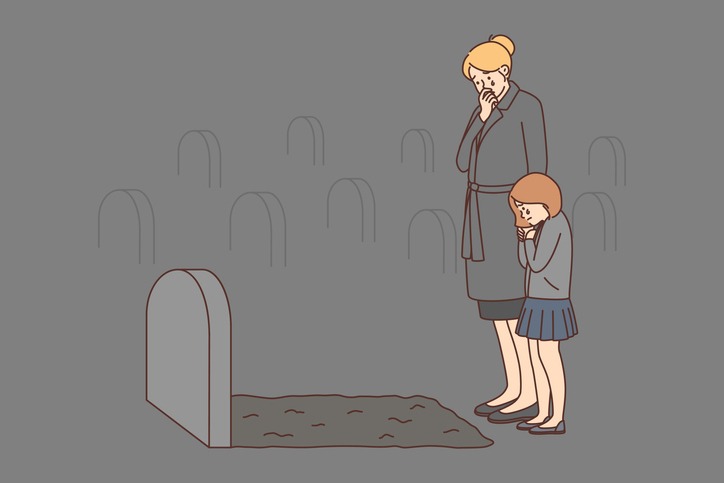
Loss and bereavement are an inevitable part of life – here are some tips on coping with these feelings in an education setting
CREDIT: This is an edited version of an article that originally appeared on Education Support
Navigating the educational landscape goes beyond textbooks and lesson plans; it encompasses the emotional and human experiences that shape our learning environments. In this article, let’s take a look into a topic often unspoken yet deeply impactful: acknowledging loss and bereavement within educational settings.
Grief knows no boundaries and affects students, educators, and staff alike. Here, we explore the importance of addressing these emotions, providing support, and fostering resilience within our educational communities. By fostering a compassionate and understanding environment, we can create spaces where healing and learning coexist, ensuring that no one walks the journey of loss alone.
These tips are written for your personal loss or bereavement, but they can all be adapted if you need to help others with their own grief.
Acknowledge and allow yourself your feelings and thoughts at times of loss
Experiencing a wide spectrum of emotions and thoughts is a natural response to loss. For instance, emotions like overwhelming sadness, appreciation for the time shared with the person, anger at their departure, or a sense of being cheated out of a chance to say goodbye are all common. Sometimes, individuals might even grapple with emotions of relief or guilt, which can be perplexing and may indicate a need for additional support from those around you. It’s important to allow yourself the space to embrace any or all of these emotions; there’s no right or wrong way to feel.
You might notice that grief can unexpectedly surge due to triggers like a specific piece of music, scents, certain foods, or places that remind you of the departed. At times, you could find yourself feeling emotionally numb and hesitant to express your feelings, fearing that others might misinterpret your response as indifference.
Balancing these contradictory emotions can be truly draining. Remember that it’s perfectly acceptable to open up about your emotions, but equally acceptable if you choose not to share at a given moment. Your feelings are valid, and there’s no one-size-fits-all approach to dealing with grief.
Developing a narrative to support your journey of grief or loss
You could develop a repeating story that helps to capture good memories relating to who or what you have lost. For example, through written narrative or in your mind, you could go to a cottage in the woods and as you enter each room, you will put in an object that holds a good memory.
For some people, talking about memories with others is more helpful than spending time developing narratives and images in their own heads If you have few or no positive memories of the person, that can make it more complicated to work through your grief. Additional support may be needed from your family, faith group, community, friends and or professionals.
Coping with the death of someone we care for is usually an emotional experience
As time goes by, some feelings will support you to grieve and recover and other feelings will slow down your healing. Don’t feel guilty if you laugh or enjoy yourself during a period of mourning.
Be respectful of how others may feel about grief, but don’t let them dictate how you should feel and be aware that feelings may be evoked in others when they hear of your grief, perhaps your loss becomes a trigger to remember their own grief. If you are grieving, you may not have the emotional space left to support them too. Try to direct them kindly towards other avenues of support.
Feeling angry is normal, staying angry can be a problem for you and those around you
Loss or bereavement can feel very lonely, even when we are doing some of the pushing away ourselves. This can lead to feelings of anger, and frustrated anger can cause us to push others further away. Break the cycle by accepting or giving a small act of kindness.
Communicate to others how you are feeling. Let them know you appreciate them, even if you can’t accept their help just yet. This may be in a text, a letter or sending a message through a third party. No communication is isolating for those you care for as well as you.
Find a way to take part in physical activity, ideally with others, but even if you are on your own exercise can provide an outlet for feelings; physical activities can help emotional regulation and support a sense of agency and self-esteem.
Actions you can take -memory making is important
Treasure something that represents a fond memory of the person who has died:
- Plant a flower they liked in a pot or garden
- Keep a photo on your laptop of a place they loved
- Choose a lovely shell or stone to keep in a pocket or a bag, so that each time you hold it you allow yourself a brief memory
Memories which make you laugh are good too, as is writing a memory in the form of a letter or eulogy which can be very supportive to you and those around you.
Plan for days which you know may be harder, such as birthdays, anniversaries or Christmas. It is okay if others have forgotten to mark those days – don’t judge them, each person copes in their own way.
‘Coping too well’ is not a thing
- Be respectful of how others manage their loss or bereavement, even if that looks like they don’t care as much as you do. Remember the wave metaphor they may be in a different place in their waves
- We don’t know how others feel and how they may mourn quietly and privately
- Not everyone needs to mourn in public, or for long – it doesn’t mean they didn’t love
- Holding positive memories and a knowledge that you had had a good relationship can mean that you feel less need to mourn
- Covering up feelings is not the same as coping. Covered up feelings will need to be tackled at some point further down the line
There is no ‘good time’ to stop grieving
Grief is not linear. Grief is a natural process to help humans heal from loss or death. It is okay to still think of those we have lost as often as we choose.
It is helpful to contain or hold those feelings, after a time of mourning, so that grief doesn’t prevent us from living our best life. It’s okay to let life begin to grow again around your grief.
If your grief continues to impact on your wellbeing, family life, relationships or ability to do your job, then you may need to seek some help.
Grieving can be hard when you are surrounded by people and children with their own immediate needs in an educational setting
Allow yourself to be distracted by your work, but there will be moments when you are also distracted from your work. Speak with a colleague if this balance is not right for you or the children you are working with.
You may find grief overwhelms you at points. Build some strategies to help manage this, for example, keep a pebble in your pocket to hold when you need a moment to refocus.
Be aware of the lessons that are coming up. If the curriculum requires the class to learn about birth this may relate. to your own loss. You could try to change the order of the curriculum, or speak with your team leader about swapping with someone else for that set of lessons,
It may be important to you to share with the children what you are going through. It could be beneficial to rehearse what you want to say with a colleague first. Children are able to show real empathy, but it is important that they don’t take on your sadness as their own burden.
You can expect the team in your education setting to support you at this time
Your setting should have a policy that relates to leave in special circumstances, which has been advised by Trade Unions. If you don’t have one, or it hasn’t been updated for a while, this may be something that you could research or revise.
Having a ‘buddy’ or a colleague who will support you during your process of bereavement can make a big difference.
Not all education settings will have enough room for you to have a quiet space for reflection if you need it, so you may want to agree to go offsite at break and lunchtimes for a few minutes to help you cope – either with or without a colleague.
Remember, it can be really hard for colleagues to know how and when to support you at these times. They may need a bit of help in knowing what will be supportive.
Take time to learn about bereavement and grief when you are not overwhelmed with such feelings yourself
- It helps to understand the usual range of moods, thoughts and feelings that can come with grief
- It can be important to know how loss and bereavement are supported by different religions and cultures
- Take time to consider how death and loss is approached in film and literature



Be the first to comment